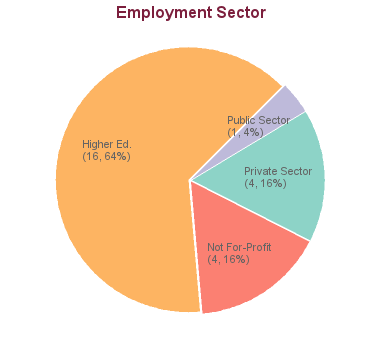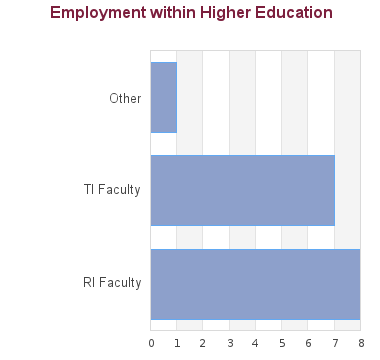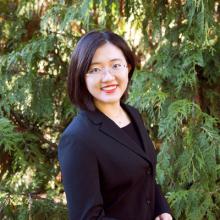Doctor of Philosophy in Sociology (PhD)
Canadian Immigration Updates
Review details about the recently announced changes to study and work permits that apply to master’s and doctoral degree students. Read more
Overview
UBC has granted Master of Arts and Doctor of Philosophy degrees in sociology since 1970, although the first sociology course was taught at the university as long ago as 1921. Students in the Ph.D. program in sociology at UBC have the opportunity to specialize in any one or more of the Department's seven major areas of specialization:
- Environment, Community and Social Movements;
- Family and Life Course;
- Gender and Sexuality;
- Health and Healthcare;
- Knowledge, Culture and Power;
- Race, Ethnicity and Immigration; and
- Work, Economy and Globalization.
What makes the program unique?
UBC sociology has a strong tradition of publishing research that matters. A sample of recent and award-winning books include: Gillian Creese's The New African Diaspora (U. Toronto Press); Amin Ghaziani's There Goes the Gayborhood? (Princeton U. Press), Renisa Mawani's Colonial Proximities(UBC Press), Becki Ross Burlesque West: Showgirls, Sex, and Sin in Postwar Vancouver (U. Toronto Press), and Wendy Roth's Race Migrations (Stanford U. Press).
UBC sociology has a strong history of engaging in community and service oriented learning projects, providing students with hands-on learning experiences carrying out research for partnering organizations in and around Vancouver (e.g. RainCity Housing, SPEC, City of Vancouver, Neighborhood House Association, Be The Change). There is a strong co-op tradition, and the Department also runs the Immigrant Vancouver Ethnographic Field School (in conjunction with the Department of Anthropology).
Quick Facts
Program Enquiries
Contact the program
Admission Information & Requirements
1) Check Eligibility
Minimum Academic Requirements
The Faculty of Graduate and Postdoctoral Studies establishes the minimum admission requirements common to all applicants, usually a minimum overall average in the B+ range (76% at UBC). The graduate program that you are applying to may have additional requirements. Please review the specific requirements for applicants with credentials from institutions in:
Each program may set higher academic minimum requirements. Please review the program website carefully to understand the program requirements. Meeting the minimum requirements does not guarantee admission as it is a competitive process.
English Language Test
Applicants from a university outside Canada in which English is not the primary language of instruction must provide results of an English language proficiency examination as part of their application. Tests must have been taken within the last 24 months at the time of submission of your application.
Minimum requirements for the two most common English language proficiency tests to apply to this program are listed below:
TOEFL: Test of English as a Foreign Language - internet-based
Overall score requirement: 100
Reading
25
Writing
25
Speaking
22
Listening
22
IELTS: International English Language Testing System
Overall score requirement: 7.0
Reading
6.5
Writing
6.5
Speaking
6.5
Listening
6.5
Other Test Scores
Some programs require additional test scores such as the Graduate Record Examination (GRE) or the Graduate Management Test (GMAT). The requirements for this program are:
The GRE is not required.
2) Meet Deadlines
3) Prepare Application
Transcripts
All applicants have to submit transcripts from all past post-secondary study. Document submission requirements depend on whether your institution of study is within Canada or outside of Canada.
Letters of Reference
A minimum of three references are required for application to graduate programs at UBC. References should be requested from individuals who are prepared to provide a report on your academic ability and qualifications.
Statement of Interest
Many programs require a statement of interest, sometimes called a "statement of intent", "description of research interests" or something similar.
Supervision
Students in research-based programs usually require a faculty member to function as their thesis supervisor. Please follow the instructions provided by each program whether applicants should contact faculty members.
Instructions regarding thesis supervisor contact for Doctor of Philosophy in Sociology (PhD)
Citizenship Verification
Permanent Residents of Canada must provide a clear photocopy of both sides of the Permanent Resident card.
4) Apply Online
All applicants must complete an online application form and pay the application fee to be considered for admission to UBC.
Tuition & Financial Support
Tuition
| Fees | Canadian Citizen / Permanent Resident / Refugee / Diplomat | International |
|---|---|---|
| Application Fee | $116.25 | $168.25 |
| Tuition * | ||
| Installments per year | 3 | 3 |
| Tuition per installment | $1,875.34 | $3,294.66 |
| Tuition per year (plus annual increase, usually 2%-5%) | $5,626.02 | $9,883.98 |
| Int. Tuition Award (ITA) per year (if eligible) | $3,200.00 (-) | |
| Other Fees and Costs | ||
| Student Fees (yearly) | $1,144.10 (approx.) | |
| Costs of living | Estimate your costs of living with our interactive tool in order to start developing a financial plan for your graduate studies. | |
All fees for the year are subject to adjustment and UBC reserves the right to change any fees without notice at any time, including tuition and student fees. Tuition fees are reviewed annually by the UBC Board of Governors. In recent years, tuition increases have been 2% for continuing domestic students and between 2% and 5% for continuing international students. New students may see higher increases in tuition. Admitted students who defer their admission are subject to the potentially higher tuition fees for incoming students effective at the later program start date. In case of a discrepancy between this webpage and the UBC Calendar, the UBC Calendar entry will be held to be correct.
Financial Support
Applicants to UBC have access to a variety of funding options, including merit-based (i.e. based on your academic performance) and need-based (i.e. based on your financial situation) opportunities.
Program Funding Packages
From September 2024 all full-time students in UBC-Vancouver PhD programs will be provided with a funding package of at least $24,000 for each of the first four years of their PhD. The funding package may consist of any combination of internal or external awards, teaching-related work, research assistantships, and graduate academic assistantships. Please note that many graduate programs provide funding packages that are substantially greater than $24,000 per year. Please check with your prospective graduate program for specific details of the funding provided to its PhD students.
Average Funding
- 13 students received Teaching Assistantships. Average TA funding based on 13 students was $17,458.
- 7 students received Research Assistantships. Average RA funding based on 7 students was $8,761.
- 10 students received Academic Assistantships. Average AA funding based on 10 students was $12,112.
- 17 students received internal awards. Average internal award funding based on 17 students was $20,423.
- 3 students received external awards. Average external award funding based on 3 students was $26,111.
Review methodology
Scholarships & awards (merit-based funding)
All applicants are encouraged to review the awards listing to identify potential opportunities to fund their graduate education. The database lists merit-based scholarships and awards and allows for filtering by various criteria, such as domestic vs. international or degree level.
Graduate Research Assistantships (GRA)
Many professors are able to provide Research Assistantships (GRA) from their research grants to support full-time graduate students studying under their supervision. The duties constitute part of the student's graduate degree requirements. A Graduate Research Assistantship is considered a form of fellowship for a period of graduate study and is therefore not covered by a collective agreement. Stipends vary widely, and are dependent on the field of study and the type of research grant from which the assistantship is being funded.
Graduate Teaching Assistantships (GTA)
Graduate programs may have Teaching Assistantships available for registered full-time graduate students. Full teaching assistantships involve 12 hours work per week in preparation, lecturing, or laboratory instruction although many graduate programs offer partial TA appointments at less than 12 hours per week. Teaching assistantship rates are set by collective bargaining between the University and the Teaching Assistants' Union.
Graduate Academic Assistantships (GAA)
Academic Assistantships are employment opportunities to perform work that is relevant to the university or to an individual faculty member, but not to support the student’s graduate research and thesis. Wages are considered regular earnings and when paid monthly, include vacation pay.
Financial aid (need-based funding)
Canadian and US applicants may qualify for governmental loans to finance their studies. Please review eligibility and types of loans.
All students may be able to access private sector or bank loans.
Foreign government scholarships
Many foreign governments provide support to their citizens in pursuing education abroad. International applicants should check the various governmental resources in their home country, such as the Department of Education, for available scholarships.
Working while studying
The possibility to pursue work to supplement income may depend on the demands the program has on students. It should be carefully weighed if work leads to prolonged program durations or whether work placements can be meaningfully embedded into a program.
International students enrolled as full-time students with a valid study permit can work on campus for unlimited hours and work off-campus for no more than 24 hours a week during academic sessions.
A good starting point to explore student jobs is the UBC Work Learn program or a Co-Op placement.
Tax credits and RRSP withdrawals
Students with taxable income in Canada may be able to claim federal or provincial tax credits.
Canadian residents with RRSP accounts may be able to use the Lifelong Learning Plan (LLP) which allows students to withdraw amounts from their registered retirement savings plan (RRSPs) to finance full-time training or education for themselves or their partner.
Please review Filing taxes in Canada on the student services website for more information.
Cost Estimator
Applicants have access to the cost estimator to develop a financial plan that takes into account various income sources and expenses.
Career Outcomes
27 students graduated between 2005 and 2013. Of these, career information was obtained for 25 alumni (based on research conducted between Feb-May 2016):


RI (Research-Intensive) Faculty: typically tenure-track faculty positions (equivalent of the North American Assistant Professor, Associate Professor, and Professor positions) in PhD-granting institutions
TI (Teaching-Intensive) Faculty: typically full-time faculty positions in colleges or in institutions not granting PhDs, and teaching faculty at PhD-granting institutions
Term Faculty: faculty in term appointments (e.g. sessional lecturers, visiting assistant professors, etc.)
Sample Employers in Higher Education
University of Ottawa (2)Memorial University of Newfoundland
Okanagan College
Western University (Ontario)
Trinity Western University
University of Edinburgh
University of Alberta
Camosun College
University of Washington
University of British Columbia
Sample Employers Outside Higher Education
Faculty Association of Simon Fraser UniversityTransplant Research Foundation of British Columbia
Pivot Legal
EMI Consulting
Environmental Resources Management
Vancouver Coastal Health
Sample Job Titles Outside Higher Education
Director (2)Owner of Berton College
Interim Executive Director
Associate Director
Sexuality Educator
Senior Consultant
Clinician
Founder, Wellness Educator
PhD Career Outcome Survey
You may view the full report on career outcomes of UBC PhD graduates on outcomes.grad.ubc.ca.Disclaimer
These data represent historical employment information and do not guarantee future employment prospects for graduates of this program. They are for informational purposes only. Data were collected through either alumni surveys or internet research.Enrolment, Duration & Other Stats
These statistics show data for the Doctor of Philosophy in Sociology (PhD). Data are separated for each degree program combination. You may view data for other degree options in the respective program profile.
ENROLMENT DATA
| 2023 | 2022 | 2021 | 2020 | 2019 | |
|---|---|---|---|---|---|
| Applications | 64 | 66 | 66 | 46 | 60 |
| Offers | 7 | 8 | 5 | 10 | 8 |
| New Registrations | 3 | 3 | 3 | 7 | 3 |
| Total Enrolment | 30 | 32 | 37 | 36 | 32 |
Completion Rates & Times
Disclaimer
Upcoming Doctoral Exams
Wednesday, 16 April 2025 - 9:00am - Room 200
Research Supervisors
Supervision
Students in research-based programs usually require a faculty member to function as their thesis supervisor. Please follow the instructions provided by each program whether applicants should contact faculty members.
Instructions regarding thesis supervisor contact for Doctor of Philosophy in Sociology (PhD)
Advice and insights from UBC Faculty on reaching out to supervisors
These videos contain some general advice from faculty across UBC on finding and reaching out to a supervisor. They are not program specific.
Doctoral Citations
| Year | Citation |
|---|---|
| 2014 | Dr. Routray studied the effects of urban planning on poor migrants in Delhi. With a focus on different modes of political mobilization, he examined their participation, negotiation and resistance to urban planning policies. Along with contributing to academia, the research findings will benefit urban planners, policy makers and grassroots activists. |
| 2014 | Dr. Buffam developed a method of comparative analysis that tracks the social and legal effects of racism across divergent geopolitical contexts. He used this method to document how racial discourses of criminality shaped the legal regulation of Chicago's African American populations and Vancouver's South Asian populations. |
| 2014 | Dr. Polanco studied Filipino migrant workers at Canadian Tim Horton`s restaurants. She traced the cultural and structural dimensions of work and labour market regulation under migrant worker schemes. One implication is Canada's introduction of a new guest worker scheme that is both ambiguous and risky with regard to transitioning to permanent status. |
| 2013 | Dr. Hwang studied ethno-racial variations in two facets of cohesion in Canada: trust in others and trust in political institutions. She explored why trust among ethno-racial communities may differ from established cultural groups. The amount of trust can differ substantially, depending on which group is asked the question and the type of trust. |
| 2013 | Dr. Martin examined the changing nature of pre-marital co-habitation over the twentieth century, and the impact on later marital stability. His work highlights ways in which changing social norms influence union formation patterns, and how marital stability is more closely associated with filtering mechanisms than pathways to union . |
| 2013 | Dr. Ove studied child sponsorship programs, the advertising they produce, and sponsors they attract. His project examined ways in which sponsorship programs and sponsors represent themselves as trying to make a difference in the world, and how these representations relate to contemporary understandings of poverty and development. |
| 2013 | Dr. Sullivan explored ways in which queer students engage with the UBC campus. She created a mapping method to reveal how these students use spatial cues to identify where they might encounter homophobia, transphobia and the privileging of heterosexuality. This research shows that queer students identify risky spaces and create queer spaces on campus. |
| 2012 | Dr. Ikebuchi conducted a study of Chinese and Japanese women who were placed in the Chinese Rescue Home in Victoria, BC, between 1886 and 1923 because they were at risk of being forced into prostitution. She found that while the white Methodist women running the Home aimed to domesticate and transform them into Christian wives, mothers and servants, the Home was a space where both white and Asian women pursued their aspirations. |
| 2012 | Dr. Wu studied migrants from Taiwan who settled in the Vancouver region in the 1960s. Their distinctive shared language and culture generated hostility from the Taiwan government, which considered them a political threat. They formed a vibrant community, deeply committed to Canadian values, and were central to the democratic movement in Taiwan in the 1990s. |
| 2012 | Dr. Woodman's thesis shows citizenship in China is a local rather than national relationship that means participation and entitlements are connected to membership in the specific place where a person belongs. Her research proposes new theoretical avenues for the study of citizenship focusing on subnational locations of politics. |
Pages
Sample Thesis Submissions
Further Information
Specialization
Sociology has specialization in the following core areas of study:
- Environment, community, and social movements;
- Family and the life course;
- Gender and sexuality;
- Health and healthcare;
- Knowledge, culture, and power;
- Race, ethnicity, and immigration; and
- Work, economy, and globalization.
Program Website
Faculty Overview
Academic Unit
Program Identifier
Classification
Program Enquiries
Contact the program
Departments/Programs may update graduate degree program details through the Faculty & Staff portal. To update contact details for application inquiries, please use this form.

Curious about UBC for grad school?
Our community of scholars is one of the world’s finest, committed to discovering and sharing knowledge, and to tackling the challenges that face our world.



